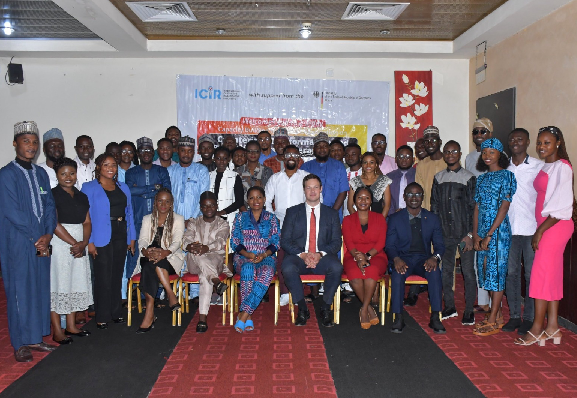Misinformation: ICIR, German Embassy trains journalists
The International Centre for Investigative Reporting (The ICIR) has commenced the training of 30 journalists selected for its Countering Misinformation and Promoting Media Literacy in Nigeria Project. The three-day training, which is sponsored by the German Embassy in Nigeria, had participants drawn from print, online and broadcast media selected from different medium across the country. […]

The International Centre for Investigative Reporting (The ICIR) has commenced the training of 30 journalists selected for its Countering Misinformation and Promoting Media Literacy in Nigeria Project.
The three-day training, which is sponsored by the German Embassy in Nigeria, had participants drawn from print, online and broadcast media selected from different medium across the country.
Daily Trust reports that the programmed The Countering Misinformation and Promoting Media Literacy in Nigeria Project aims to combat the dissemination and impact of misinformation in Nigeria by promoting media literacy and responsible information sharing among citizens.
Speaking during start of the programme, ICIR‘s Executive Director Dayo Aiyetan, represented by the FactCheckhub Editor, Opeyemi Kehinde, said the fight against misinformation in Nigeria could not be won without the media.
He said this necessitated the capacity building of media professionals to counter misinformation and disinformation narratives via their various platforms to attain the goal of The ICIR and encourage the public to imbibe the culture of fact-checking.
In his welcome address, the German Embassy’s First Secretary of Political Affairs Nigeria, Mathias Dold, said the online space has become dangerous when religious, ethnic or otherwise identity-related content is used to incite conflict between groups, which may result in violence.
He noted that the EU Election Observation Mission in Nigerian 2023 elections concluded in its final report a large amount of misleading content, “allegedly produced by political camps as well as various individuals, regularly targeted actors across the political system.”
He stated that the identified influential members of leading political parties regularly spread unverified or false information targeting their opponents.
“While critical reporting was at times also referred to as ‘fake news’ by some political actors. This worsened an already opaque information environment, marred by a plethora of misleading content.”
He added that the report, however, mention the positive role of the Fact-checkers coalition that increased awareness during the political season in the country.
“But disinformation and fake news are not only dangerous in the Nigerian context. On the recent coup d’etat in Niger, we saw the effect of misinformation, especially about Western, specifically French involvement. ECOWAS, so the narrative, was being coerced to start a war with Niger by France, and the government of His Excellency Bola Ahmed Tinubu but a puppet government of the West.”
